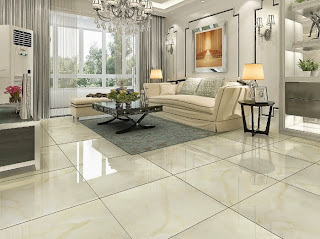Porcelain tiles and ceramic tile are essentially the same, with one slight difference. Both are part of the larger category of tiles we can call ceramic. It is more a case of reverse-naming, whereby manufacturers take tiles that have certain qualities and then assign the ceramic or porcelain titles to them.
Add into this a healthy dose of marketing-speak and sales pitch. Tile people often tout porcelain's storied history, evoking its Italian etymology--porcellana, which means cowrie shell. Fine porcelain-ware is white, translucent, strong, and it has a fine, dense body. They mention how fine china is made of porcelain.
But none of that applies to porcelain tile. This is different ball game. It's a game of branding and certifying, and has nothing to do with fine china.
(And certainly porcelain tile and ceramic tile can be considered close cousins when discussing other, wildly different types of tile such as quarry tile, glass tile, or natural stone.)
Let's dig a little deeper before you make that huge investment (and irreversible installation) of tile in your kitchen, bathroom, or entryway.
Difference: Water Absorption Rate
Porcelain tile has a water absorption rate of 0.5% as defined by American Society for Testing and Materials (ASTM) C373. Fired tile is weighed. Then it is boiled for 5 hours and then let to sit in water for 24 hours afterward. Then it is weighed again. If the tile weighs less than half of one-percent more as a result of water absorbing into its surface, it is considered porcelain.
Porcelain tile is often extruded; has less impurities than ceramic; is often rectified; and often contains more kaolin than ceramic. It's formed of quartz, clay, and feldspar that is fired at temperatures ranging from 1200-1400 degrees C.
But since that also defines many ceramics, again the difference is that porcelain has that 0.5% or less water absorption rate.
Interior or Exterior: No Ceramic Outside
Laying porcelain or ceramic tile outside is typically not recommended. Ceramic is usually not durable enough for exterior use because it absorbs too much water. If you live in areas which freeze, your tile would likely crack on the first freezing night. Stone is a better option.
Even though conventional wisdom has been to keep porcelains/ceramics away from the outside, I'm seeing more that are for exterior use. We would still recommend buying porcelain that is expressly designated for exterior use.
Density: Porcelain Denser Than Ceramic
Porcelain clays are denser and thus less porous than ceramic clays. This makes porcelain tile harder and more impervious to moisture than ceramic tile.
Durability: Porcelain Wins
Not only is porcelain tile more dense than ceramic tile, but due to its through-body composition it is considered more durable and better suited for heavy usage than ceramic tile. Chip the ceramic tile and you find a different color underneath the top glaze. Chip the porcelain and the color keeps on going--the chip is nearly invisible.
While both porcelain and ceramic are fired, porcelain is fired at higher temperatures for a longer time than ceramic. Also, porcelain has higher feldspar content, which makes it more durable.
Ease of Cutting: Ceramic a Softer Cut Than Porcelain
The aforementioned density has a good side and a bad side. While ceramic is less dense than porcelain, it's also a far easier material for DIY homeowners to cut--by hand, by wet tile saw, or snap tile cutter. Porcelain is more brittle and may require the experienced hand of a tile-setter to cut properly.
Which One Is Cheaper?
All other factors equal, ceramic tile is cheaper than porcelain tile.
The Oversea Sales General Manager of Foshan Hudson Economics and Trade Co., Ltd said that ceramic tends to be about 65% of the cost of porcelain.
PEI Rating: Porcelain Higher Than Ceramic
PEI ratings for porcelain tile tend to be around 5 (heavy residential and commercial traffic). PEI ratings for ceramic tile can range anywhere from PEI 0 (no foot traffic) up to PEI 5, but with most ratings in the lower end of the scale.
Factory and Wholsaler:
Foshan Hudson Economics and Trade Co., Ltd
Tell: +86 0757-82279676
Mail: sales@hudsonchina.com
Web: http://hudsonchina.com/
Foshan Hudson Economics and Trade Co., Ltd
Tell: +86 0757-82279676
Mail: sales@hudsonchina.com
Web: http://hudsonchina.com/



welcome to visit us to get your writing material:
ReplyDeleteOfficial website: Hudsonchina.com